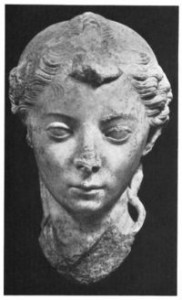 The star of my new novel, SONG OF THE NILE, is Cleopatra Selene. However, another young woman plays a very prominent role, and that is Julia, the daughter of Rome’s first emperor. Though their parents were mortal enemies, in my novel, the two teenaged girls form a strong bond of friendship.
The star of my new novel, SONG OF THE NILE, is Cleopatra Selene. However, another young woman plays a very prominent role, and that is Julia, the daughter of Rome’s first emperor. Though their parents were mortal enemies, in my novel, the two teenaged girls form a strong bond of friendship.
On the surface, they don’t seem to have much in common. Where Selene is serious and careful, Julia is witty and reckless. Where Selene is thought of as a royal captive, the daughter of an Egyptian whore, Julia is known as the revered daughter of the emperor, a veritable Roman princess whose children will one day rule Rome. And yet, the two have more in common than most people know.
Selene’s mother is dead and Julia’s mother might as well be, since her father banished her mother from her life. Both girls live at the mercy of the emperor who sees them both as useful pawns in his dynastic schemes–trophies to reward the loyalty of his generals and cronies. While both girls are whip-smart and have an aptitude for politics, Augustus values only their wombs. He controls their sexuality, dictates their love lives, and tries to smother their spirits.
So how much of this is true to history? Almost all of it.
The historical Julia was taken away from her mother at birth and raised by Augustus and his wife Livia. It’s said that she lived a dreary childhood of spinning wool and weaving cloth, but once she reached her teen years, she was married off to her first cousin Marcellus, the heir apparent. Whilst Marcellus was alive, the handsome teens seemed like a romantic pairing, so when Marcellus died young of some mysterious ailment, leaving Julia a young widow, she won the people’s sympathy.
Pretty, witty, educated and fashionable, the emperor’s daughter was popular with the people. Perhaps some of them pitied her when she was next married off to her father’s general, Agrippa, a man who was much older and had already been married twice before. Though Julia was one of the most educated women in the Roman empire, her mission was to provide sons who could be adopted by the emperor to take over after he died.
In terms of breeding, Julia seems to have taken the duty seriously and performed with grace. She gave birth to three sons and two daughters, thus ensuring that the Julio-Claudian dynasty would survive. Though she gave her body to the husband her father chose for her, it seems clear that she considered her heart to be her own to give as she pleased. It’s said that she kept a lover and when someone asked how her children all looked so much like Agrippa, she intimated that she waited to be pregnant before engaging in adultery, saying, “I never take on new passengers unless the cargo is already full.”
Julia’s story has a dramatic ending–one that I won’t reveal here lest I give spoilers that might ruin the enjoyment of my readers. Let it suffice to say, she’s one of the most interesting “bad girls” of the ancient world, and that’s probably why I love her!


I have to admit – I have a soft spot for Julia. Mostly because of the unfortunate marriage to Agrippa and the dramatic ending you’re not mentioning so I won’t either.
I’m totally with you, Melissa. I’m not mentioning it because it’s going to come up in my third book and I don’t want to spoil things for my readers, but everyone has access to wikipedia these days!
I have often wondered about Julia, and what events and people around her influenced her, for good or ill. It cannot have been easy being daughter of Augustus, by any means. I look forward to your take on her story!
Yes. Augustus was such a complicated man that the relationship had to be difficult. And yet, there is affection there too. Julia had a witty word for her father when he criticized her clothing as revealing too much one day, then praised her for covering up the next. “Today I dress for my father, but yesterday I dressed for my husband.” It’s all very fascinating!